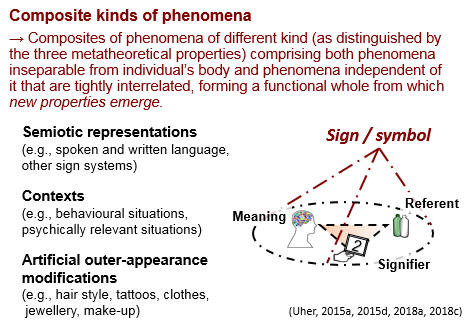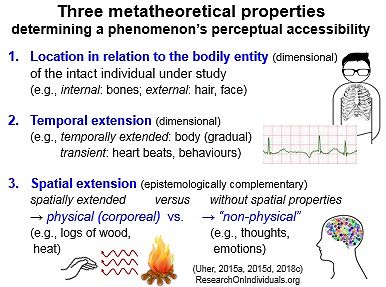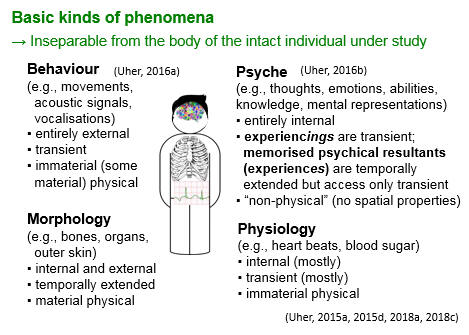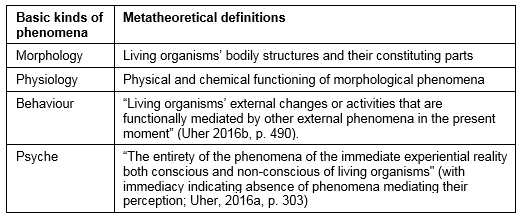Transdisciplinary Research on Individuals
Transdisciplinary
Philosophy-of-Science (TPS) Paradigm
Transdisciplinary Philosophy-of-Science Paradigm for Research on Individuals (TPS Paradigm)
- Metatheoretical framework -
- Three metatheoretical properties
- Conceptual differentiation of various kinds of phenomena
- Metatheoretical definitions of study phenomena
- Behaviour versus psyche: An important distinction often made only implicitly
Three metatheoretical properties
Given that all science is done by humans, the TPS Paradigm defines as a phenomenon anything that humans can perceive or can make perceptible (e.g., technically) and/or that humans can conceive. (This notion that differs from various philosophical thought traditions, such as Kant's).
These particular properties are considered because they determine perceptibility of a given phenomenon by humans - and thus also by researchers. Given this, they also determine accessibility of many further properties that can be perceived in the study phenomena (e.g., colour) or inferred from them (e.g., causal mechanisms) and that are largely within the focus of research. Their labelling as metatheoretical indicates that these properties are conceived on a level of abstraction not commonly considered; but only time and space constitute ontological categories (Uher, 2013, 2015a, 2015d, 2018c). |
Conceptual differentiations of various kinds of phenomena
|
The three metatheoretical properties and the particular constellation of their forms are used to conceptually differentiate various kinds of phenomena studied in individuals. These are metatheoretical categories of phenomena defined on the basis of their modes of accessibility; they are not meant to constitute ontological categories (Uher, 2015a, 2015d, 2018a, 2018c).
 These conceptual differentiations, as they are based on modes of accessibility, have important implications for research methodology as specified in the paradigm's methodological framework |
Metatheoretical definitions of study phenomena
|
What is behaviour? What is the psyche? Building on the metatheoretical
differentiations, the TPS Paradigm also provides metatheoretical definitions of
the phenomena studied.
|
Behaviour versus psyche: An important distinction often made only implicitly
The metatheoretical definitions and differentiations highlight important distinctions between behaviour and psyche, which is often made only implicitly such as in concepts of 'inner behaviours' and 'outer behaviours'. This blurrs important differences in accessibility, which have profound implications on research methods.
Behaviours are external and therefore publically accessible (Uher, 2016a, What is behaviour?), whereas the psyche is imperceptible by others and accessible only by the individual itself and nobody else. Psychical phenomena can only be inferred indirectly from individuals' externalisations in behaviour and language, which are other kinds of phenomena than psyche itself (Uher, 2015d, Agency enabled by the psyche).
This distinction is essential to explore the tight functional interactions between psyche and behaviour (e.g., in actions). These are also important criteria for methods enabling investigations of psychical phenomena (Uher, 2016b, Exploring the workings of the psyche).
More information available in Publications and Science Blogs.
© 2013-2026
 At the metatheoretical framework's core, there are three
abstract properties that can be conceived in different
constellations for every phenomenon studied in research on individuals.
At the metatheoretical framework's core, there are three
abstract properties that can be conceived in different
constellations for every phenomenon studied in research on individuals. 
